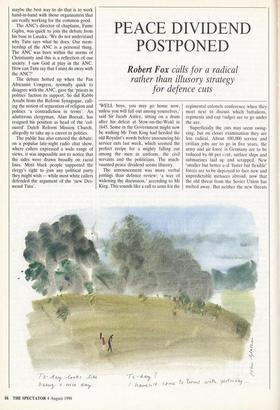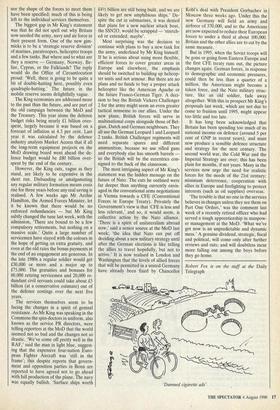PEACE DIVIDEND POSTPONED
Robert Fox calls for a radical
rather than illusory strategy for defence cuts
'WELL boys, you may go home now, unless you will fall out among yourselves,' said Sir Jacob Astley, sitting on a drum after his defeat at Stow-on-the-Wold in 1645. Some in the Government might now be wishing Mr Tom King had heeded the old Royalist's words before announcing his service cuts last week, which seemed the perfect recipe for a mighty falling out among the men in uniform, the civil servants and the politicians. The much- vaunted peace dividend seems illusory.
The announcement was more verbal jottings than defence review; 'a way of widening the discussion,' according to Mr King. This sounds like a call to arms for the regimental colonels conference when they meet next to discuss which battalions, regiments and cap badges are to go under the axe.
Superficially the cuts may seem swing- eing, but on closer examination they are less radical. About 100,000 service and civilian jobs are to go in five years, the army and air force in Germany are to be reduced by 60 per cent, surface ships and submarines laid up and scrapped. New 'smaller but better and 'faster but flexible' forces are to be deployed to face new and unpredictable menaces abroad, now that the old threat from the Soviet Union has melted away. But neither the new threats nor the shape of the forces to meet them have been specified; much of this is being left to the individual services themselves.
The biggest gap in Mr King's statement was that he did not spell out why Britain now needed the army, navy and air force in their present form. One of the new gim- micks is to be a 'strategic reserve division' of marines, paratroopers, helicopter troops and a few tanks. But where and to what are they a reserve — Germany, Norway, Be- lize, Cyprus, or the Falklands? The reply would do the Office of Circumlocution proud: 'Well, there is going to be quite a bit of double-hatting here, possibly even quadruple-hatting.' The future in the mobile reserve seems delightfully vague.
The King economies are addressed more to the past than the future, and are part of the old campaign between the MoD and the Treasury. This year alone the defence budget risks being nearly £1 billion over- spent, largely because it was based on a forecast of inflation at 4.5 per cent. Last year it was calculated by the defence industry analysts Market Access that if all the long-term equipment projects on the MoD drawing board went ahead the de- fence budget would be £80 billion over- spent by the end of the century.
However, the King cuts, vague as they stand, are likely to be expensive in the short run. Disbanding or amalgamating any regular military formation means costs rise for three years before any real saving is realised. A few weeks ago Mr Archie Hamilton, the Armed Forces Minister, let it be known that there would be no enforced redundancies — but Mr King subtly changed the tune last week, with the admission, 'There are bound to be a few compulsory retirements, but nothing on a massive scale.' Quite a large number of servicemen have stayed with the colours in the hope of getting an extra gratuity, and even at the old rates the bonus payments at the end of an engagement are generous. In the late 1980s a regular soldier would get £30,000 or more and a major up to £75,000. The gratuities and bonuses for 60,000 retiring servicemen and 20,000 re- dundant civil servants could take about £5 billion (at a conservative estimate) out of the defence costings over the next five years.
The services themselves seem to be facing the changes in a spirit of genteel resistance. As Mr King was speaking in the Commons the spin-doctors in uniform, also known as the service PR directors, were telling reporters at the MoD that the world seemed not so bad and the changes not so drastic. 'We've come off pretty well in the RAF,' said the man in light blue, suggest- ing that the expensive four-nation Euro- pean Fighter Aircraft was 'still in the frame'; this despite reports that govern- ment and opposition parties in Bonn are reported to have agreed not to go ahead with full production of the plane. The navy was equally bullish. 'Surface ships worth £41/2 billion are still being built, and we are likely to get new amphibious ships.' De- spite the cut in submarines, it was denied that plans for a new nuclear attack boat, the SSN20, would be scrapped — 'stretch- ed or extended, maybe'.
Most surprising was the decision to continue with plans to buy a new tank for the army, underlined by Mr King himself.
If he is serious about using more flexible, efficient forces to cover greater areas in Europe and elsewhere, the emphasis should be switched to building up helicop- ter units and not armour. But there are no plans and no funds to buy a proper attack helicopter like the American Apache or the future Franco-German Tiger. A deci- sion to buy the British Vickers Challenger 2 for the army might seem an even greater tactical nonsense to our allies. Under the new plans, British forces will serve in multinational corps alongside those of Bel- gian, Dutch and German neighbours. They all use the German Leopard 1 and Leopard 2 tanks. British Challenger regiments will need separate spares and different ammunition, because we use rifled guns and everybody else has smooth barrels — so the British will be the eccentrics con- signed to the back of the classroom.
The most intriguing aspect of Mr King's statement was the hidden message on the future of Nato. The cuts he outlined were far deeper than anything currently envis- aged in the conventional arms negotiations in Vienna towards a CFE (Conventional Forces in Europe Treaty). Privately the Government's view is that `CFE is less and less relevant,' and so, it would seem, is collective action by the Nato alliance.
'There is a spirit of unilateralism abroad now,' said a senior source at the MoD last week; 'the idea that Nato can put off deciding about a new military strategy until after the German elections is like telling the allies to travel hopefully, but not to arrive.' It is now realised in London and Washington that the levels of allied forces that will be permitted in a united Germany have already been fixed by Chancellor Kohl's deal with President Gorbachev in Moscow three weeks ago. Under this the new Germany will field an army and airforce of 370,000, and so the Americans are now expected to reduce their European forces to under a third at about 100,000. Britain and the other allies are to cut by the same measure.
But in 1995, when the Soviet troops will he gone or going from Eastern Europe and the first CFE treaty runs out, the picture changes again. German forces, in response to demographic and economic pressures, could then be less than a quarter of a million, the Americans might become a token force, and the Nato military struc- ture, like an old soldier, fade away altogether. With this in prospect Mr King's proposals last week, which are not due to come to fruition until 1995, might appear too little and too late.
It has long been acknowledged that Britain has been spending too much of its national income on defence (around 5 per cent of GNP in recent years), and must now produce a sensible defence structure and strategy for the next century. The second world war, the Cold War and the Imperial Strategy are over; this has been plain for months, if not years. Many in the services now urge the need for realistic forces for the needs of the 21st century: minimum deterrence, cooperation with allies in Europe and firefighting to protect interests (such as oil supplies) overseas.
'The trouble is that no one in the services believes in changes unless they see them on Part One Orders,' was the comment last week of a recently retired officer who had served a tough apprenticeship in manpow- er management at the MoD. 'What we've got now is an unpredictable and dynamic mess.' A genuine dividend, strategic, fiscal and political, will come only after further reviews and cuts; and will doubtless incur more falling out among the boys before they go home.
Robert Fox is on the staff at the Daily Telegraph
'Damned cigarette ads'

















































 Previous page
Previous page